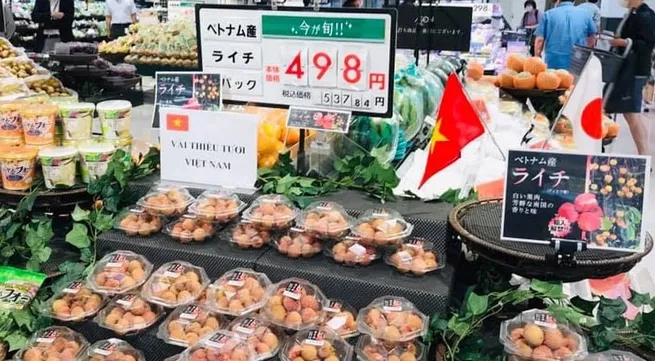Lychee exports to Japan: great opportunity for small fruits

Popularity in Japan
In the last days of June, 2020, the first batch of fresh lycheefrom Vietnam exported to Japan was officially sold at AEON's distribution system, including across 250 general department stores, AEON supermarkets and AEON Style shops around the country. That was the first time Vietnamese fresh lychee had been exported to the Japanese market and AEON was the first retailer selling and introducing Japanese consumers to one of Vietnam’s favourite fruits.
According to a representative from Japan’s AEON supermarket, in order to ensure optimum quality, fresh lychees sold at the supermarket were transported by air between late May and late June. Therefore, customers can enjoy the fruit with the best possible taste. The lychee initially conquered Japanese consumers as they were consumed quickly and appreciated for their beautiful colour, freshness and good flavour.
In addition to AEON, several other supermarkets in Japan began to sell Vietnamese lychee that were harvested in the 2020 crop after the market opened the door to the fruit. Export to Japan despite the Covid-19 pandemic affirms the reputation of Vietnamese lychee, contributing to increasing its value and paving the way to promoting high-quality production of this fruit. Around 200 tonnes of lychee are expected to be exported to Japan by air and sea.
Following five years of negotiations and careful preparations on the raw materials needed to meet the strictest standards, the first batch of lychee were successfully exported to Japan. The relevant agencies in Bac Giang province are still coordinating with Japanese experts to review, instruct and closely monitor the process of producing, harvesting and preserving fresh lychee in Luc Ngan district in order to meet the demands of this fastidious market.
Notably, Thanh Ha lychees from Hai Duong province have been exported to Japan.
The strict control of quality
Given the fact that Japan is one of the most fastidious markets in the world with strict requirements, Vietnamese functional agencies have paid special attention to ensuring the quality of exported lychee. In recent times, the Ministry of Agriculture and Rural Development and Ministry of Industry and Trade have proactively coordinated with relevant agencies and localities to select and grant 19 eligible production unit codes for 103 hectares of lychee and 107 households. The total output is expected to reach over 600 tonnes.
Speaking on the first shipments of lychees exported to Japan, Director of Bac Giang provincial Department of Agriculture and Rural Development, Duong Thanh Tung, said that since the plan to export lychees to the Japanese market was announced, the department has worked with the relevant agencies to identify production unit codes and closely monitor the process of caring for the fruits in accordance with the partner’s requirements.
“Following its initial successes, Luc Ngan district will continue to guide and increase the number of production unit codes to expand its area and output, constantly meeting the standards of the Japanese side. The locality will also continue to cooperate with Japan while expanding exports to other markets around the world”, said Director Tung.
According to Vietnamese trade counsellor in Japan Ta Duc Minh, with great efforts in the negotiations, lychee is the fourth fruit from Vietnam which has successfully entered the Japanese market, following dragon fruit, mango and banana. Therefore, enterprises should note that Japan is a country with extremely strict requirements on product quality; therefore, in order to help the product gain a strong foothold in this market, they should strictly comply with all regulations on the quarantine and standards of food hygiene and safety, he added.
It is essential to pay special attention to quarantine because any batch of fresh lychee with pesticide residue exceeding Japan’s regulations will be returned or destroyed even if treated with fumigation. In addition, the exported fruit must be harvested from areas certified with production unit codes. The control of plant protection drug residue and the tracing of product originwill always be conducted.
To ensure quality and avoid mistakes in the first year of lycheeexport to Japan, the relevant Vietnamese agencies invited a Japanese expert to supervise all batches of exported lychee. This showed Vietnam’s seriousness and determination to export lychee correctly.
According to the Vietnam Trade Office in Japan, the batches of lychee were packed in small boxes of 200g and sold at supermarkets with a promotional price of JPY489 (original price JPY537), equivalent to VND100,000) for each. Accordingly, 1kg of Vietnamese lychees priced up to over VND500,000.
Lychee is a short-term fruit; therefore, its appearance in Japan and the high appreciation of Japanese consumers will be a good springboard to expand its consumption to other fastidious markets and improve its value. Especially, exports will eliminate serious depreciation of the fruits’ prices.





